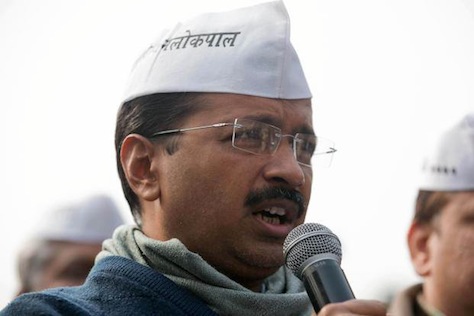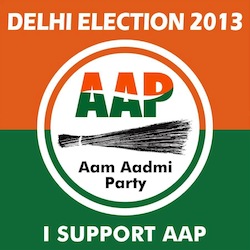Guest post by Devin Finn
On February 7, when Delhiwallas go to the polls to vote for candidates for all 70 seats in the Vidhan Sabha (विधान सभा) — the union territory’s Legislative Assembly — the Aam Aadmi Party (AAP, आम आदमी की पार्टी, literally the ‘Common Man’ Party) has another opportunity to prove it knows how to remake politics.![]()
The AAP’s leader Arvind Kejriwal has promised to end corruption and improve the lives of the poor. Hanging in the balance are several fundamental political processes: ongoing efforts to chip away at corruption, an unprecedented movement to combat violence against women, and the possibility that an alternative vision of politics may find support among voters.
Opinion polls indicate a tight race, with party leaders from both prime minister Narendra Modi’s Bharatiya Janata Party (the BJP, or भारतीय जनता पार्टी) and the AAP trading barbs and accusations of rules violations. After a rough 2014, AAP is attempting to concentrate strength in Delhi and demonstrate that it can govern. AAP has sought to contest as many seats as possible, build a widespread political movement in Delhi, and train and equip activists who can exploit social media to generate precise and effective messaging. Even if AAP loses, will politics be the same?
* * * * *
RELATED: Meet Arvind Kejriwal,
the rising anti-corruption star of Indian politics
RELATED: Did Kejriwal err in resigning as Delhi’s chief minister?
* * * * *
The AAP campaign labors in the shadow of its brief administration a year ago. In a serious upset in December 2013, Delhi voters elected Kejriwal by a considerable margin to his New Delhi constituency seat, and handed AAP the reins to the city, albeit dependent on outside support from the previous governing party, the Indian National Congress (भारतीय राष्ट्रीय कांग्रेस). After only 49 days, however, Kejriwal resigned: he had promised to do so on principle if lawmakers failed to pass the Jan Lokpal, a parliamentary bill that would mandate an independent ombudsman to curb corruption.
Most Delhi voters and political analysts I conversed with during last spring’s election season asserted that Kejriwal’s resignation was no way to change politics. This was perhaps borne out by AAP’s electoral humiliation in the national vote in April and May 2014. Spreading itself thin, the fledgling party won just four seats out of over 400 it contested. Meanwhile, the BJP gained 51.9% of all seats and a comprehensive mandate.
Still, it is those ’49 days’ that both haunts and enlivens the AAP campaign. Kejriwal has apologized to supporters for reneging on the opportunity to lead the Delhi government. While he lost significant political capital by staking his leadership on the bill, Kejriwal now knows that he must play the political game for real. He has tried to demonstrate that in less than just two months, the concrete initiatives that AAP put in motion were on the right track, including establishing an anti-corruption hotline and 5500 new auto rickshaw permits. Rahul Kanwal thinks this could be an asset:
The poor actually liked those 49 chaotic days. That was when electricity and water bills had halved and the neighbourhood cop and bijliwala were too scared to ask for bribes. The day Kejriwal’s government fell is the day the ravenous agent of the state was back on the poor man’s door asking for his monthly hafta.
While the #49DaysNostalgia lends an air of experience to today’s AAP effort, the proof of the pudding is in the eating, as Kejriwal likes to say. The question is whether voters are willing to support AAP after its two serious missteps in 2013 and 2014. At least three major issues are at stake. Continue reading Kejriwal’s AAP looks for second chance in Delhi vote



